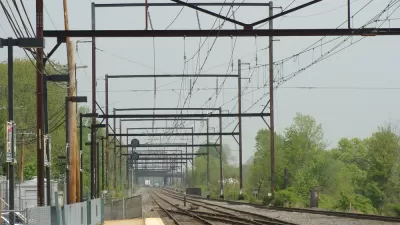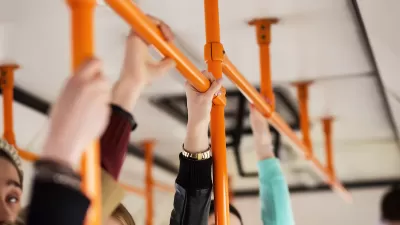As ridership revenues drop, more agencies are looking to diversify their income sources by leasing agency-owned land to developers.

With ridership "plummeting" during the pandemic, cash-strapped transit agencies are turning to leasing real estate to recover lost revenue, reports Jenni Bergal. "Many large transit agencies already have their own real estate departments and for years have been leasing property—often parking lots near rail stations—to development companies," with rent subsidizing operations and maintenance. Encouraging transit-oriented development near stations is "seen as a way not only to create a long-term revenue stream, but also to increase ridership, minimize traffic congestion and help communities by providing jobs and housing, some of it affordable, near transit."
"Agencies have been experimenting with scrapping or reducing fares or adding service to bring back riders and ensure access for disadvantaged communities. During the pandemic, the majority of people who continued to ride buses and trains were essential workers with low incomes, often people of color." The shift toward cheaper or free fares, along with the precipitous fall in ridership caused by the pandemic, has "prompted many transit agencies to look at various ways to diversify their funding beyond relying on fareboxes and federal, state and local dollars."
"[S]ome transit agencies that have gotten into the real estate business are trying to develop affordable housing projects. They often lease to private developers, but sometimes they work with nonprofits, community groups or local governments." Jessie O'Malley Solis, an agency program manager for the Santa Clara Valley Transportation Authority, says "transit-oriented development offers the agency the opportunity to fund normal operations as well as service improvements and enhancements" that will prove solid investments in the system's future.
FULL STORY: Transit Agencies Lease Real Estate to Generate Much-Needed Cash

Alabama: Trump Terminates Settlements for Black Communities Harmed By Raw Sewage
Trump deemed the landmark civil rights agreement “illegal DEI and environmental justice policy.”

Planetizen Federal Action Tracker
A weekly monitor of how Trump’s orders and actions are impacting planners and planning in America.

The 120 Year Old Tiny Home Villages That Sheltered San Francisco’s Earthquake Refugees
More than a century ago, San Francisco mobilized to house thousands of residents displaced by the 1906 earthquake. Could their strategy offer a model for the present?

In Both Crashes and Crime, Public Transportation is Far Safer than Driving
Contrary to popular assumptions, public transportation has far lower crash and crime rates than automobile travel. For safer communities, improve and encourage transit travel.

Report: Zoning Reforms Should Complement Nashville’s Ambitious Transit Plan
Without reform, restrictive zoning codes will limit the impact of the city’s planned transit expansion and could exclude some of the residents who depend on transit the most.

Judge Orders Release of Frozen IRA, IIJA Funding
The decision is a victory for environmental groups who charged that freezing funds for critical infrastructure and disaster response programs caused “real and irreparable harm” to communities.
Urban Design for Planners 1: Software Tools
This six-course series explores essential urban design concepts using open source software and equips planners with the tools they need to participate fully in the urban design process.
Planning for Universal Design
Learn the tools for implementing Universal Design in planning regulations.
Clanton & Associates, Inc.
Jessamine County Fiscal Court
Institute for Housing and Urban Development Studies (IHS)
City of Grandview
Harvard GSD Executive Education
Toledo-Lucas County Plan Commissions
Salt Lake City
NYU Wagner Graduate School of Public Service





























